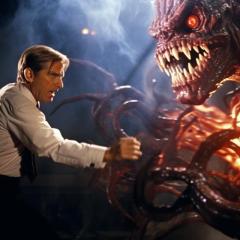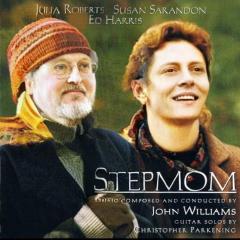-
Posts
9,281 -
Joined
-
Last visited
Reputation Activity
-
 Henry B got a reaction from karelm in Must-Read: Stravinsky on Film Music
Henry B got a reaction from karelm in Must-Read: Stravinsky on Film Music
It really doesn't surprise me to read this. Stravinsky was an egomaniacal old crank and compulsive liar who was constantly on the offensive about one composer or the other. He didn't even come around to liking Beethoven until he was well into his 80s.
He was also a film composer himself. Most people don't know this because Stravinsky's music never made it into any released film. But in 1942, Stravinsky was watching jingoistic propaganda films and gunning for the composer position on The Song of Bernadette. He eventually was passed over for Alfred Newman. But all of these endeavors went into the Symphony in Three Movements of 1943-45. The second movement is a complete score cue intended for The Song of Bernadette.
Stravinsky went on to pursue a number of other film projects, none of which came to fruition. He did write The Flood: a musical play for CBS in 1962, but that was a project in which the music came first, so it's not really scoring.
What I take from Stravinsky's weird conceits is that artists are often not the most trustworthy witnesses.
-
 Henry B reacted to Luke Skywalker in Jurassic World (Jurassic Park 4)
Henry B reacted to Luke Skywalker in Jurassic World (Jurassic Park 4)
specially if it is an alternate universe with a full working park.
-
 Henry B reacted to Sharkissimo in Why Most Action Films Are Terrible
Henry B reacted to Sharkissimo in Why Most Action Films Are Terrible
Not all Bonds are action films, although that became the norm once Harry Saltzman left.
-
 Henry B reacted to #SnowyVernalSpringsEternal in The Hobbit Film Trilogy Thread
Henry B reacted to #SnowyVernalSpringsEternal in The Hobbit Film Trilogy Thread
I mentioned loving Tauriel's look several tones. But i get heckled and bashed here.
Maked me feel unwanted, unloved.
I cry myself asleep at night.
-
 Henry B got a reaction from indy4 in Questions about Music Theory Thread
Henry B got a reaction from indy4 in Questions about Music Theory Thread
Yes. A triad is any chord composed of any three notes regardless of interval. F-A-C is a root position F major triad. C-F-A is an F major triad in second inversion. A-F-C is an F major triad in first inversion.
-
 Henry B got a reaction from Hunterus in There Will Be Blood Extended Score
Henry B got a reaction from Hunterus in There Will Be Blood Extended Score
In case anyone is interested in knowing, I've compiled an extended version of Jonny Greenwood's There Will Be Blood. This score got almost no attention around here, but I think people would like it if they knew it. Track list:
1. Open Spaces
2. Future Markets
3. Prospectors Arrive
4. Stranded the Line
5. Detuned Quartet
6. Arvo Pärt: Fratres for Cello & Piano
7. Prospectors Quartet
8. Proven Lands (Extended)**
9. Henry Plainview
10. HW / Hope of New Fields (unused in film)
11. Oil
12. Eat Him by His Own Light (Extended)**
13. Johannes Brahms: Violin Concerto in D, Op. 77 - 3. Poco Piu Presto
14. There Will Be Blood
15. Future Markets (Chamber Version)**
16. HW / Hope of New Fields (Orchestral Version)*
17. Prospectors Quartet (Orchestral Version)*
* Nonesuch Records digital bonus track
** ripped from DVD documentaries
I didn't include the concert pieces Greenwood infamously borrowed from because his adaptations were not direct. Everything here is an original recording from the film (or the appropriate licensed track). It's mostly in chronological order, except where I didn't like the sequencing ("Prospector's Quartet" followed by "Prospector's Quartet (Orchestral Version"). I think the highlight is the material added to "Proven Lands." Boiling strings, I call it. There's unfortunately more such music that remains unreleased. Anyway, as per the rules of the forum, I'm simply... saying that I've put this CD together for my own listening.
-
 Henry B got a reaction from Kendal_Ozzel in Jurassic Park 20th Anniversary OST (Digital only release)
Henry B got a reaction from Kendal_Ozzel in Jurassic Park 20th Anniversary OST (Digital only release)
Cool! I really like that unreleased cue where everybody gets into the jeep to tour Jurassic Park. (And yes, Jason, you can yell at me for not knowing the proper cue title.)
-
 Henry B got a reaction from ShowUStheHOOK in Making sense of John Williams' higher education
Henry B got a reaction from ShowUStheHOOK in Making sense of John Williams' higher education
Today there are some diploma programs that allow students to earn an exclusively musical education with an emphasis on performance in lieu of a bachelor's degree. Maybe Williams went through something like that. More likely he simply dropped out of school for professional opportunities. I think the degree was less important then. Even today, I've met a couple college professors with only bachelor's degrees, or not even a bachelor's. Performance (or composition) is the most important credential, even though the master's and/or doctorate helps a lot.
-
 Henry B got a reaction from Alishia.Duffield in Intrada Will Release Poledouris' Conan The Barbarian and Conan The Destroyer
Henry B got a reaction from Alishia.Duffield in Intrada Will Release Poledouris' Conan The Barbarian and Conan The Destroyer
I don't think the Destroyer recording is totally horrible. The orchestra is smaller than it should be, but it's still performed professionally. I don't recall any severe performance mistakes (though I only know the 30 minute OST). I also think the OST has a very dry, artificial sounding mix. That's something Intrada will probably correct.
However, Tadlow's recording is excellent, and is worth it for the Sword and Sorcery Suite if nothing else.
-

-

-
 Henry B got a reaction from karelm in Modern Film Scores Are Terrible
Henry B got a reaction from karelm in Modern Film Scores Are Terrible
I completely disagree with everything you've said, and I seriously wonder if you've actually been through a college music program, or have any knowledge of one. The goal of most college music programs is to create well-rounded musicians. Harmonic analysis is the focus of two or three semesters of theory, yes, but that comprises only a small part of a music degree. There's history, ear training, writing, conducting, pedagogy and above all performance. Most music degrees are chiefly about equipping students to find work in professional ensembles or in teaching positions. Some tracks like history and composition prepare students for further studies in grad school. Experience is certainly built into the curriculum. Music education students are required to do a semester of student teaching to earn their degrees. I had to put on an entire recital of my own compositions for my degree. I was able to have a piece performed by the university orchestra. For performance students, a half-recital junior year and a full recital senior year is required. History students have to write a thesis. You get the idea. But no matter your concentration, you will undoubtedly come out of college with a deeper understanding of what music is, where it comes from and how to perform it. Of course a school can't completely let imaginations soar because there would be no structure to such a program. Students are taught all the major forms and historical trends because knowledge enriches. You seem to think that genius develops best in a vacuum. That runs completely against everything we know. Nearly every prodigious composer was also a respected performer and teacher. Some were also conductors, critics, historians, and so on. They were all educated in the musical traditions of their time, and would have been afforded far less freedom than music students today. If you simply turn a person loose in the work world to gain experience, with no training and guidance, the result is usually disastrous.
And colleges dismiss musical prodigies for being too individualistic? I'm convinced you just made that up on the spot. Most students I knew, especially piano and string students, began their studies at a very early age. Actually, I was unusual because I didn't start taking piano lessons until age 10. Most gifted and well developed students come into college eager to expand their experience and understanding, not to shut themselves away and ignore the history of music.
You say harmonic analysis leads to works like Inception. Do you even know what harmonic analysis is? Most undergrad programs cover music of the late Baroque and Classical periods, counterpoint in the style of J.S. Bach. Do you know who Bach is? Yeah... he doesn't really sound like Hans Zimmer. By the way, Zimmer got his start in pop music and never went through a conservatory program. He didn't care much for the formal training that you seem so eager to trash.
There's only one possible cause I can find for all these claims, which is that many of today's blander composers have formal training. For example, Brian Tyler went to UCLA and Harvard. But drawing a straight line between the overproduced, creatively bankrupt music most of us dislike and college music programs is completely wrong. You're ignoring everything the studio system does to composers. Look, college music professors hate this stuff most of all. My composition professor didn't like the idea of me trying to make it as a Hollywood composer because he felt that it stifled creativity and even human decency.
You hate today's conformity, but everything you say makes it obvious that you just want yesterday's conformity back.
You're about twenty years out of date here. Some game music continues to be looped, but many games call for all the same standalone forms that film does. Many feel that game music is actually outpacing film music at the moment in terms of creativity and expression. I bet you don't really know any game composers. Maybe you've heard of Mario and Pac-man and assume that game music is a bunch of robotic beeps. If you're interesting in actually getting up to speed on this stuff, check out:
Nobuo Uematasu
Jeremy Soule
Mark Griskey
Inon Zur
Peter Land
Jared Emerson-Johnson
James Hannigan
Christopher Lennertz
Stephen Rippy
Garry Schyman
Jack Wall
Just for starters.
-

-
 Henry B reacted to chuck in What Is The Last Score You Listened To? (older scores)
Henry B reacted to chuck in What Is The Last Score You Listened To? (older scores)
The First Great Train Robbery - Jerry Goldsmith. A refreshing change from what I usually hear from JG.
Favorites from this score are "Double Wax Job", "The Gold Arrives", and of course, the "Main" and "End" Titles.
-
 Henry B reacted to Faleel in Star Trek: The Motion Picture on the big screen in Los Angeles Monday June 4th
Henry B reacted to Faleel in Star Trek: The Motion Picture on the big screen in Los Angeles Monday June 4th
There is no comparison.
-








